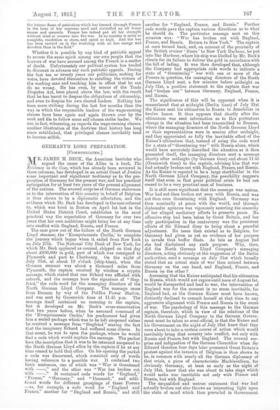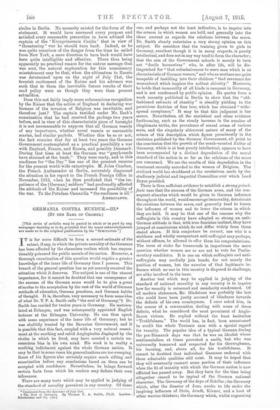1,1" R. JAMES M. BECK, the American barrister who argued
the cause of the Allies in a book, The Evidence in the Case, which has already been reviewed in these columns, has developed in an actual Court of Justice some important and significant testimony as to the pre- paration of Germany for the present war, and her practical anticipation for at least two years of the present alignment of the nations. The avowed surprise of German statesmen as to the intervention of this country in behalf of Belgium is thus shown to be a diplomatic affectation, and the evidence which Mr. Beck has developed in the case referred to, which was tried in Boston on April let last in the United States District Court, establishes in the most practical way the expectation of Germany for over two years that her own ambitions might bring her at any time into conflict with England, Russia, and France.
The case grew out of the failure of the North German Lloyd steamer, the 'Kronprinzessin Cecilia' to complete the journey which began when it sailed from New York on July 27th. The National City Bank of New York, for which Mr. Beck appeared as counsel, shipped on that day about 4800,000 in gold, part of which was consigned to Plymouth and part to Cherbourg. On the night of July 31st, at about 10 o'clock (ship-time), when the German steamer was about a thousand miles from Plymouth, the captain received by wireless a cryptic message, which stated that one Erhard was afflicted with catarrh, and the message bore the signature of " Sieg- fried," the code word for the managing directors of the North German Lloyd Company. The message came from Bremen by way of the Poldhu Power Station, and was sent by Greenwich time at 11.45 p.m. The message itself contained no meaning to the captain, but it developed on Mr. Beck's cross-examination that two years before, when he assumed command of the Kronprinzessin Cecilie,' his predecessor had given him a sealed package which was to be left unopened unless' he received a message from "Siegfried" stating the fact that the imaginary Erhard had suffered some illness. In that event, ho was to open the package, where he would find a code which would explain the message. The packet bore the inscription that it was to be returned unopened to the North German Lloyd office by the captain if he at any time ceased to hold that office. On his opening the packet a code was discovered, which consisted only of words having reference to a possible war. It contained two basic sentences, one of which was " War is threatened with --," and the other was " War has broken out with" It contained code words for "England," "France,"—. "Germany," and ." Denmark," and, . addi- tional words for different groupings of , these Powers —as, for example, a code word . for "England and France," another for "England and Russia," and still another for " England, France, and Russia." Further code words gave the captain various directions as to what he should do. The particular message sent on this occasion was : " War has broken out with England, Franca, and Russia. Return to New York." The captain at once turned back, and, on account of the proximity of the British cruiser ' Essex ' to New York Harbour, be put into Bar Harbour, where his ship was libelled by Mr. Beck's clienta for its failure to deliver the gold in accordance with the bill of lading. It was thus developed that, although the Company had appropriate code words to indicate a state of threatening " war with one or more of the Powers in question, the managing directors of the North German Lloyd sent, a few minutes before midnight on July 31st, a positive statement to the captain that war had " broken out " between Germany, England, France, and Russia.
The significance of this will be apparent when it is remembered that at midnight (Berlin time) of July 31st the Kaiser sent his ultimatum to Russia to demobilize in twelve hours. It thus appears that shortly after the ultimatum was sent information as to this portentous change in the situation had been transmitted to Bremen, where the managing directors of the North German Lloyd or their representatives were in session after midnight, and they appreciated so fully the inevitable effect of the Kaiser's ultimatum that, instead of using the code word for a state of " threatening war" with Russia alone, which would have accurately described the situation as it then presented itself, the managing directors sent a message shortly after midnight (by German time) and about 11.45 (Greenwich time) to the captain, advising him that war bad actually broken out with England, France, and Russia. As the Kaiser is reputed to be a large stockholder in the North German Lloyd Company, the possibility suggests itself that even in that great political crisis he had not ceased to be a very practical man of business.
It is still more significant that the message was untrue. War had not then broken out even with Russia, and was not then even threatening with England. Germany was then nominally at peace with the world, and through diplomatic agencies was vigorously asserting the sincerity of her alleged mediatory efforts to preserve peace. No offensive step had been taken by Great Britain, and her only participation in the controversy was the persistent efforts of Sir Edward Grey to bring about a peaceful adjustment. No issue then existed as to Belgium, for Germany had given as yet no evidence of her purpose to invade that buffer State. As late as August 2nd she had disclaimed any such purpose. Why, then, did the North German Lloyd Company's managing directors, acting obviously at the suggestion of the Berlin authorities, send a message on July 31st which broadly stated that an actual state of war then existed between Germany on the one hand, and England, France, and Russia on the other ?
Assuming that the Kaiser anticipated that his ultimatum to Russia, which would not expire until noon of August let, would be disregarded and lead to war, the intervention of England was for the moment in no sense inevitable, for England had, as the German Kaiser must have known, distinctly declined to commit herself at that time to any aggressive alignment with France and Russia in the event of war. The psychology of this message to the German captain, therefore, which in view of the relations of the North German Lloyd Company to the German Govern- ment must be taken as semi-official, is that the Kaiser and his Government on the night of July 31st knew that they were about to take a certain course of action which would inevitably bring that country into conflict, not only with Russia and France, but with England. The avowed sur- prise and indignation of the German Chancellor when Sir Edward Goschen four days later presented Great Britain's protest against the invasion of Belgium is thus shown to be, in common with nearly all the German diplomacy of that crisis, a piece of characteristic Machiavellism, for obviously Germany, at least as early as the night of July 31st, knew that she was about to take steps which would make war inevitable not only with France and Russia; but with England. The unqualified and untrue statement that war had actually broken out also throws an interesting light upon the state of mind which thou prevailed in Government circles in Berlin. No necessity existed for the form of the statement. It would have answered every purpose and satisfied every reasonable precaution to have advised the captain of the 4Kronprinzessin Cecilia' that in view of " threatening " war he should turn back. Indeed, as he was quite conscious of the danger from the time he sailed from New York, a mere direction to turn back would have been quite intelligible and effective. There thus being apparently no practical reason for the untrue message that was sent, the natural explanation for this unnecessary misstatement may be that, when the ultimatum to Russia was determined upon on the night of July 31st, the feverish excitement of the Kaiser and his advisers was such that to them the inevitable future results of their mad policy were as though they were then present actualities.
Does this not fairly imply some subconscious recognition by the Kaiser that the action of England in declaring war because of the invasion of Belgium was inevitable, and therefore just ? The captain testified under Mr. Beck's examination that he had received the package two years before, and in view of this characteristic piece of foresight it is not unreasonable to sappose that all German vessels of any importance, whether naval vessels or mercantile marine, had similar packets. Whether this be so or not, the fact remains that for at least two years the German Government contemplated as a practical possibility a war with England, France, and Russia, and possibly Denmark. During that time at least the German war "greyhounds have strained at the leash." They were ready, and in this readiness for "the Day" has one of the greatest reasons for the present world-wide catastrophe. M. Jules Cambon, the French Ambassador at Berlin, accurately diagnosed the situation in his report to the French Foreign Office in November, 1913, a hen he then predicted that "the im- patience of the [German] soldiers" had profoundly affected the attitude of the Kaiser and increased the possibility of the war. To the Potsdam Ca.marilla, the readiness is all,"
AMERICANIIS.



































 Previous page
Previous page